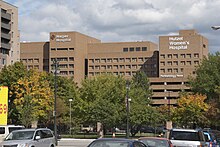Hutzel Women's Hospital
| Hutzel Women's Hospital | |
|---|---|
| Detroit Medical Center | |

Harper Hospital and Hutzel Women's Hospital
|
|
| Geography | |
| Location | Detroit, Michigan, United States |
| Coordinates | 42°21′07″N 83°03′25″W / 42.35186°N 83.05682°WCoordinates: 42°21′07″N 83°03′25″W / 42.35186°N 83.05682°W |
| Organization | |
| Hospital type | Specialist |
| Services | |
| Speciality | Women |
| History | |
| Founded | 1868 |
| Links | |
| Website | www.hutzel.org |
| Lists | Hospitals in Michigan |
Hutzel Women's Hospital is one of the eight institutions that compose the Detroit Medical Center. The hospital itself is connected to Harper University Hospital, on the midtown Detroit campus of the Medical Center. It is the only hospital in Southeast Michigan dedicated to women’s care.
Hutzel Women's Hospital is the second oldest hospital in the city of Detroit. It traces its lineage to the period right after the American Civil War when a group of seven women formed an association in 1868 to provide care for unwed mothers and their infants.
Throughout the late 19th century and early and mid-20th century the hospital became known for its innovative care of women and children, including Detroit's first baby incubator, Michigan's first research laboratory devoted to the "study of women's diseases," and establishment of the nation's first "Mother's Milk Bureau" to ensure a supply of breast milk to infants of non-lactating mothers.
In 1965 the Hospital was renamed Hutzel Women's Hospital in honor of Eleonore Hutzel, recognizing her 54 years of service as student, employee and trustee of the Hospital. Since that time the hospital has seen its services grow to include orthopaedics, ophthalmology, a pain clinic and sleep center.
Hutzel is home to the nation’s only National Institutes of Health (NIH) Perinatology Research Branch.
Hutzel Services include: High-Risk Pregnancy Care, Maternal-Fetal Medicine, Minimally Invasive Surgery, Incontinence/Urogynecology, Long-term Birth Control, Menopause and Bariatric (Weight Loss) Surgery
1898: Detroit's first infant incubator for salvaging premature babies.
1909: Michigan's first research laboratory devoted to the study of "the diseases of women."
1912: Detroit's first hospital-based social services department which ensured that the holistic view of total treatment - including follow-up - was used with all patients, regardless of their ability to pay. Establishment of the nation's first "Mother's Milk Bureau" to ensure a supply of breast milk to infants of non-lactating mothers.
1915: Establishment of the city's first hospital-based prenatal clinics.
1928: The first hospital to routinely segregate maternity patients from medical/surgical patients to prevent disease contamination.
1955: Opened the first fertility center in Detroit.
1972: The nation's first hospital to develop and use xeroradiography for the early detection of breast cancer.
...
Wikipedia
